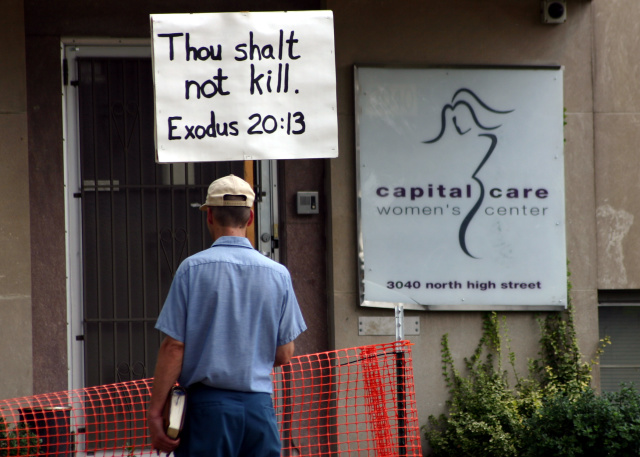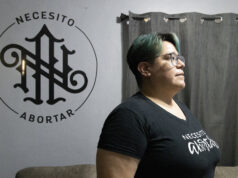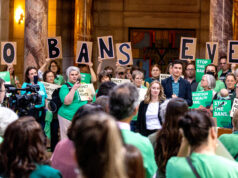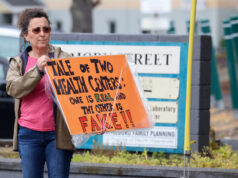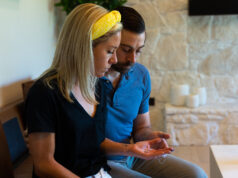The Catholic Holy Year of Mercy begins on Dec. 8 and runs through Nov. 20, 2016. There’s a logo, an official prayer, and — oh yeah — the opportunity to have your abortion forgiven.
I would never claim to know much about Catholicism; I have only been to a mass or two. For this reason, I won’t try to delve into the complexities of the religion with so little knowledge — I think that would be disrespectful.
But I have spent a lot of time on my own religious journey. From birth to date, I’ve spent a lot of time in different churches, exploring what’s right for me and, now, my family. I was raised in a Christian non-denominational church. I have checked out Pentecostal faith, spent a great deal of time in Baptist and other Bible-based churches, and most recently have been at LifeChurch. I definitely don’t have all the answers, but I am trying follow my heart (while also using my head) and gain understanding.
In most churches I’ve been part of, a recurring theme has been the grace of God — how to get it and how to keep it. It is one of the most important doctrines in every church, and how churches operate seems greatly based on their views of forgiveness and grace.
So now, news about the Pope forgiving abortions has been weighing heavily on my mind. In short, priests can offer the forgiveness during the Holy Year of Mercy.
How is this possible? How is one man — albeit, the Pope — able to set a time limit on grace? Can forgiveness come with an expiration?
Don’t get me wrong. I agree with forgiveness. I love his idea that women can be accepted for something that previously kept them from the church. I have read quotes from the Pope saying he wants to emphasize mercy, and I am grateful that he is showing more love and less condemnation. What I don’t understand is how it will only be possible for a year.
Because of this, I wanted to hear from someone who has had an abortion, to know how this news made her feel. I wanted to understand her experience and emotions to gain better perspective. Through a friend — to stay totally anonymous — I delivered questions to a woman who has had an abortion. She has actually had three abortions. The following is her opinion on the subject.
What are your religious beliefs?
I am a Christian.
Do you have regrets about getting three abortions?
“Regret” in relationship to abortion has always seemed like such an insufficient word to me. I’m not specifically referring to the lack of severity it implies. That too – the pain I’ve felt at times, especially in the beginning, when I began to understand that I rejected and killed three of my children, when I began wondering who they were, who they would have become, “regret” is a tiny word. But more often, it’s difficult to describe — you see the person I was then is literally not the person I am now. I have an indescribable amount of trust that my Lord has given me beauty for ashes … and the testimony He has given me has brought healing to many and has been used to save lives on so many different levels. I also have the hope that I will see my children’s faces some day … that their eyes will be filled only with love. Even describing this now brings feelings of remorse, but it is wrapped with immeasurable gratitude.
How does the Pope’s decision to forgive abortion make you feel?
The Pope can only forgive abortion insofar as it affects him personally.
Are you bothered by the fact that the forgiveness is only offered within a certain amount of time — the Holy Year of Mercy?
I don’t even know what the Holy Year of Mercy is or how that forgiveness is supposed to work, so I can’t really comment.
Do you feel that forgiveness with an expiration date is unfair, or does it offer you comfort?
I wouldn’t call it unfair … I would say that it is dangerous. That, at its best, it will do nothing but confuse Catholic women, causing them to question why they don’t feel forgiven. At its worst, it will bring a false sense of comfort and lead people away from the One that can actually bring forgiveness. It reminds me of this passage in Jeremiah: “Yes, even my prophets and priests are like that. They are all frauds. They offer superficial treatments for my people’s mortal wound. They give assurances of peace when there is no peace.”
If you knew that the Pope was going to forgive the sin of abortion, would it have affected your decision to get them?
The Roman Catholic Church is probably responsible, in part but not primarily, for bringing about some awareness of the Law of God and that abortion is sin … in fact a particularly shameful wicked sin. Without the awareness of sin, evil or whatever you want to call it … one does not understand the need for forgiveness. So, the Pope was better off just leaving it how it was, I suppose. Now, many MORE women might feel like they can kill the child in their womb and then turn right around and be forgiven for it. In other words, it seems like it will add to the justifications people already use when obtaining abortions. His decision was obviously made, or at least portrayed as, for the benefit of post-abortive women but without regard for pre-born children. This is quite detestable and will probably lead more women down the path of murder, ultimately defeating his portrayed purpose. Having said all of that — I was not Catholic or Christian back then so the Pope’s decision would not have affected my decision for abortion at all.
This woman has obviously changed a great deal since the time in her life when she had the abortions. I hurt for her and the pain she has suffered, but I caution the thinking in her last response, a tone that judges those that may be in the same predicament she previously was.
Whether you have had an abortion (or multiple ones), are a strict Catholic, a proper Baptist or have never set foot in a church — who am I to judge?
Acceptance would make this world a lot better for us all, and while we dream of that, let’s at least hope that the upcoming year of unorthodox forgiveness is only the beginning of a lot more mercy.









